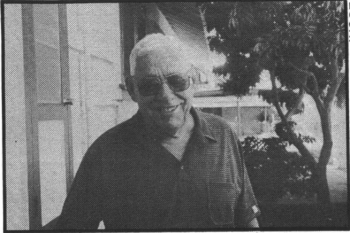Albert O. Adams

Kalihi: Place of Transition
This project features life history interviews with present and former longtime residents of Kalihi, a multi-ethnic working-class district located west of downtown Honolulu, which has a long history as a home of island immigrants.
Albert Oliveira Adams, Portuguese, was born May 21, 1909, in Nuuanu, Oahu. At age seven, Albert and his family moved to Ashford Street in Kalihi. He has remained in Kalihi ever since. Albert attended Kalihi-Waena School, completing the sixth grade. He held a variety of jobs: awning shop worker, caddy, stevedore, and dock watchman. He was also active in community-sponsored sports activities. In 1929, Albert began his career as a civilian defense worker at Luke Field, working primarily in the dope and fabric department. In 1936, the entire operation was moved from Luke Field (Ford Island) toHickam Field. Albert worked there until his retirement in 1965. Today he lives in Kalihi Kai with his wife. He attends senior citizens' activities and is an active member of the Kalihi Thundering Herd Club.
Scope and Content Note
The interview with Albert O. Adams provides a rich and detailed account of his life, career, and experiences in Kalihi, Oahu. The interview covers a wide range of topics, including Adams' early life in Nuuanu and Kalihi, his family background, and his childhood memories, such as his grandmother's bread-making and interactions with his cousins. It also delves into his various jobs, including working in an awning shop, being a caddy, a stevedore, and a dock watchman, as well as his experiences as a civilian defense worker at Luke Field and Hickam Field. The interview provides insights into the social and cultural life of Kalihi, with Adams sharing stories about community-sponsored sports activities, barefoot football teams, and local games and activities. Additionally, the interview captures Adams' reflections on the changes in Kalihi over time and his thoughts on how the area would be remembered in the future. Overall, the interview offers a comprehensive and personal account of Albert O. Adams' life, providing valuable insights into the history, culture, and community life of Kalihi, Oahu, making it a valuable resource for understanding the social and cultural dynamics of the area.
Program Note:
This interview is part of the Center for Oral History's project Kalihi: Place of Transition. Interviews from this project are available in the Center's ScholarSpace open access repository.
The Center for Oral History (COH), in the Department of Ethnic Studies at the University of Hawaiʻi at Mānoa, collects, documents, preserves and highlights the recollections of Native Hawaiians and the multi-ethnic people of Hawaiʻi. It produces oral histories and interpretive historical materials about lifeways, key historic events, social movements and Hawaiʻi’s role in the globalizing world, for the widest possible use.
Please Note: The oral histories in this collection are protected by copyright and have been created for educational, research and personal use as described by the Fair Use Doctrine in the U.S. Copyright law. Please reach out Voices@noaa.gov to let us know how these interviews are being used in your research, project, exhibit, etc. The Voices staff can help provide other useful resources related to your inquiry.
The NOAA mission is to understand and predict changes in climate, weather, oceans, and coasts, to share that knowledge and information with others, and to conserve and manage coastal and marine ecosystems and resources. The Voices Oral History Archives offers public access to a wide range of accounts, including historical materials that are products of their particular times, and may contain offensive language or negative stereotypes.
Voices Oral History Archives does not verify the accuracy of materials submitted to us. The opinions expressed in the interviews are those of the interviewee only. The interviews here have been made available to the public only after the interviewer has confirmed that they have obtained consent.
